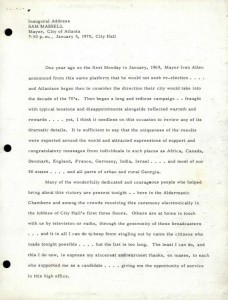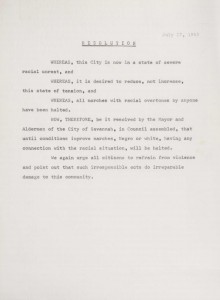
We would like to welcome two new collections from our partners at the Atlanta History Center: the Sam Massell Papers Collection and the Living Atlanta Oral History Collection.
The Sam Massell Papers collection contains a diverse set of materials representing the life and career of Sam Massell, Jr., who served as mayor of Atlanta from 1970 to 1974. These resources provide an excellent perspective of Massell’s career as a politician and businessman, and contain information relating to the many civic, political, and business organizations in which Sam Massell was involved.
Paul Crater, Vice President, Research Services at the Atlanta History Center remarks on the significance of the Sam Massell Papers collection: “Very few of Atlanta’s mayors left their papers to archival institutions and the Sam Massell papers are uniquely positioned to offer researchers insights into his time in office and of Atlanta politics and social conditions in general.”
The Living Atlanta oral history collection includes oral history interviews of Atlantans discussing race relations, social life, customs, economic conditions, politics, and government during the twentieth century.
Crater notes that the Living Atlanta oral history collection “presents a diverse group of interviewees on a wide range of (still) relevant topics and offer many examples of commentary and reminiscences that I believe our audiences will find compelling.” He recommends listening to an interview conducted with Alice Adams, an African American domestic worker who began working in the 1930s: “She talks about the reality of working 12-14 hour days for very low pay and having to endure riding on segregated trolleys and street cars to and from her job. She muses on the irony of how she could serve food, clean houses, change babies, make beds, and do laundry for whites and yet was not allowed to sit next to a white person on a street car. Her ability to clearly illustrate the absurdity of the custom of segregation is riveting.”
We hope that you enjoy these two newest resources from the Atlanta History Center!


